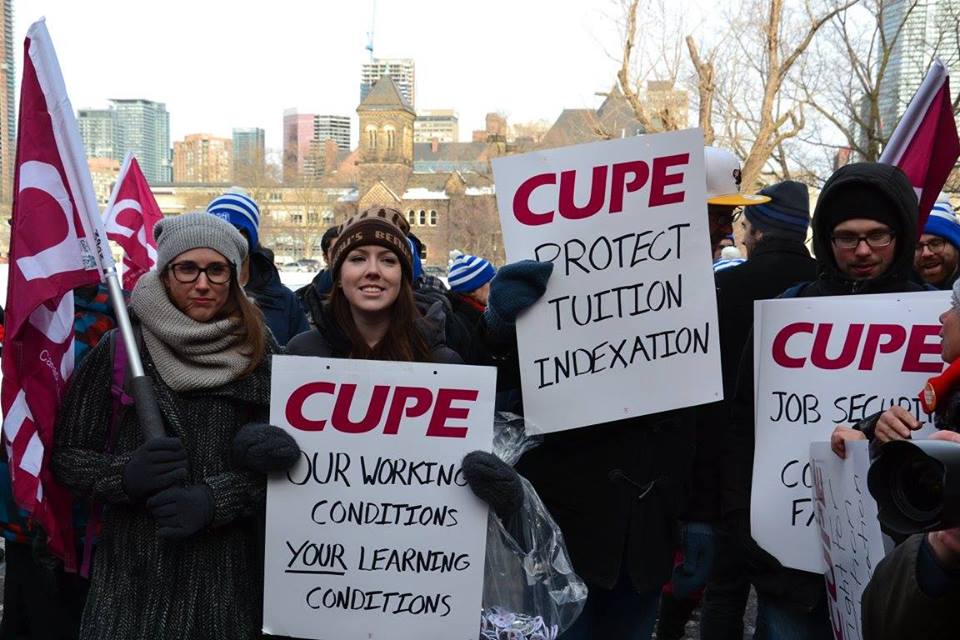On May 19 at the Special General Membership Meeting (SGMM), members of CUPE 3903 voted on and approved a provisional strike timeline.
Since the expiry of their collective bargaining agreement on August 31, 2020, SGMMs have been held to discuss proposals in relation to the future of their position. The two parties — York and CUPE 3903 — have been negotiating and exchanging proposals since bargaining began late last fall. There are several steps in the Provisional Bargaining Timeline that would prevent a strike, with these negotiations being one.
CUPE 3903 Chairperson Vanessa Lehan-Streisel states that since the beginning of negotiations there have only been “two minor sign-offs” to show for the amount of conversations they have had.
“The employer keeps presenting the union with ‘take it or leave it’ ultimatums rather than coming to the table with proposals that allow us to talk through the issues both parties want addressed, and to come to a negotiated settlement,” says Lehan-Streisel.
According to a CUPE 3903 update posted on May 12, York issued “ultimatums” most recently at a meeting held on May 8. Previously, a similar “comprehensive pass” — as CUPE 3903 puts it — was made on April 19.
Equity is one of the focuses of the union’s proposal. The document acknowledges the university’s attempts in responding directly to individual components of the proposals that CUPE 3903 set out. The full proposal package is available online.
Soon-to-be biology graduate Dylan Stoll, says he would feel “frustration and anger” if he had to undergo another strike in his time at the university. Stoll was a student during the 2015 and 2018 strikes that occurred at York, noting that in these situations students can be left feeling “exasperated and hopeless.”
“I was just trying to get through my undergrad as stress-free as possible and those strikes made my undergrad experience very difficult,” says Stoll.
“The last thing students want is to be used as bargaining chips, which, unfortunately with York, seems mandatory at least once every few years at this point.”
Echoing Stoll’s sentiments, York alumnus Dennis Bayazitov underwent the last two strikes as well, describing the experience as “frustrating” since “most students just want to attend their commuter school, secure good grades, and land a proper job after graduating.
“The last thing they want is to be used as bargaining chips, which, unfortunately with York, seems mandatory at least once every few years at this point.”
Lehan-Streisel adds: “It’s unfortunate, but historically York has never come to the bargaining table in a serious way without the union holding a strike mandate vote.”
“York is charging a hefty sum for an undergrad that practically guarantees at least one strike,” explains Stoll. “I don’t think that’s fair.”
Bayazitov adds that this “predictable cycle” of unsuccessful negotiations to meet a collective bargaining agreement, as well as potential labour disruptions, has become “a definitive characteristic of York U” — one that Bayazitov believes high school guidance counsellors are likely discussing with their students.
When Excalibur reached out to the university for comments regarding the timeline approved by CUPE 3903, York’s Deputy Spokesperson Yanni Dagonas redirected us to York’s Collective Bargaining Update posted on May 26.
This update acknowledges previous and future meetings involving CUPE 3903, York, mediator Chris Albertyn, and provincially appointed conciliation officers. The meetings to come will take place between June 4 and June 30, with “equity and job stability for Unit 2” being the focus.
To coincide with the community update sent out by York, Lehan-Streisel stresses that “this round of bargaining has always been about equity,” with benefits, unpredictable funding, and job stability being some focuses for the bargaining team.
A strike mandate vote will be held from July 5 to July 9. According to Lehan-Streisel, “this is only a legal step — we will have another vote in the fall to evaluate any new proposals from the employer, and then, will only vote to strike if strictly necessary.”
The bargaining timeline makes note of a no-board report, which, according to Lehan-Streisel, states that both parties are too far apart to reach an agreement. This allows either York to lock out CUPE 3903 members or for CUPE 3903 to enter a legal strike position.
With files from Mahdis Habibinia.



